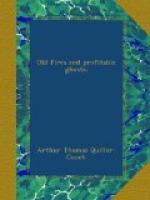He took the plaque. His brows contracted, and presently he laid it on the table, drew my chair towards him in an absent-minded fashion, and, sitting down, rested his brow on his open palms. I can recall the attitude plainly, and his bent head, and the rain still glistening in the waves of his black hair.
“Where did you find this?” he asked, but without looking up.
I told him. “The engraving upon it is singular. I thought that possibly—”
“Oh, that,” said he, “is simplicity itself. An eagle displayed, with two heads, the legs resting on two gates, a crescent between, an imperial crown surmounting—these are the arms of the Greek Empire, the two gates are Rome and Constantinople. The question is, how it came where you found it? It was covered with plaster, you say, and the plaster whitewashed? Did you discover anything near it?”
Upon this I told him of the frescoes and charcoal drawings, and roughly described them.
His fingers began to drum upon the table.
“Have you any documents which might tell us when the wall was first plastered?”
“The parish accounts go back to 1594—here they are: the Registers to 1663 only. I keep them in the vestry. I can find no mention of plastering, but the entries of expenditure on whitewashing occur periodically, the first under the year 1633.” I turned the old pages and pointed to the entry “Ite paide to George mason for a dayes work about the churche after the Jew had been, and white wassche is vjd.”
“A Jew? But a Jew had no business in England in those days. I wonder how and why he came.” My visitor took the old volume and ran his finger down the leaf, then up, then turned back a page. “Perhaps this may explain it,” said he. “Ite deliued Mr. Beuill to make puision for the companie of a fforeste barke yt came ashoare iiis ivd.” He broke off, with a finger on the entry, and rose. “Pray forgive me, sir; I had taken your chair.”
“Don’t mention it,” said I. “Indeed I was about to suggest that you draw it to the fire while Frances brings in some supper.”
To be short, although he protested he must push on to the inn at Porthlooe, I persuaded him to stay the night; not so much, I confess, from desire of his company, as in the hope that if I took him to see the frescoes next morning he might help me to elucidate their history.
I remember now that during supper and afterwards my guest allowed me more than my share of the conversation. He made an admirable listener, quick, courteous, adaptable, yet with something in reserve (you may call it a facile tolerance, if you will) which ended by irritating me. Young men should be eager, fervid, sublimis cupidusque, as I was before my beard grew stiff. But this young man had the air of a spectator at a play, composing himself to be amused. There was too much wisdom in him and too little emotion. We did not, of course, touch upon any religious question—indeed, of his own opinions on any subject he disclosed extraordinarily little: and yet as I reached my bedroom that night I told myself that here, behind a mask of good manners, was one of those perniciously modern young men who have run through all beliefs by the age of twenty, and settled down to a polite but weary atheism.




